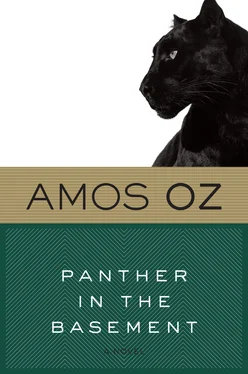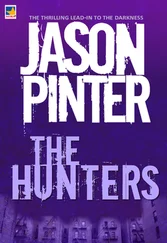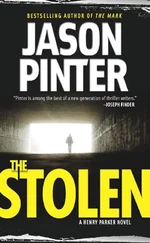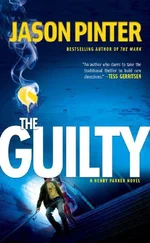The FOD Organization that summer consisted of only three fighters: Ben Hur, the commander in chief and also head of the Department of Internal Security and Interrogation. I was his second in command. Chita Reznik was a private and a leading contender for promotion when the organization expanded. Apart from being second in command, I was also regarded as the brains: it was I who founded the organization, at the beginning of the summer holidays, and gave it its name, FOD (short for "Freedom Or Death"). It was my idea to collect nails, bend them, and scatter them on the approach road to the army camp so as to puncture the British tires. And I composed the slogans that Chita was ordered to paint in thick black letters on the walls of neighboring houses: "Brits, you're in the wrong — go back where you belong!" "With blood fire and sweat our freedom we'll get!" "Perfidious Albion, hands off Zion!" (I learned the expression "perfidious Albion" from Father.) Our plan for the summer was to finish building our secret rocket. In a derelict hut on the edge of the wadi, behind Chita's backyard, we already had the electric motor from an old refrigerator, some parts from a motorbike, and several dozen yards of electric wire, fuses, a battery, bulbs, and six bottles of nail varnish, from which we planned to extract the acetone to make explosives. By the end of the summer the rocket would be finished and aimed precisely at the façade of Buckingham Palace, where King George of England lived, and then we were going to send him a proud, firm letter: You have till the Day of Atonement to get out of our country, and if you don't, then our Day of Judgment will become your Day of Reckoning.
What would the British have replied to this letter if we had only had another two or three weeks and managed to finish making our rocket? Perhaps they would have seen sense and cleared out, thus sparing themselves and us a good deal of blood and suffering. It's hard to know. But in the middle of the summer my secret relationship with Sergeant Dunlop was discovered. I had hoped it would last forever and never be found out. And because it was discovered, the writing appeared on the wall and I received the order to appear that evening at the edge of the Tel Arza Woods, to face a court-martial on a charge of treason.
The fact is I knew in advance that the trial would make no difference. No explanations or excuses would help me. As in all clandestine movements everywhere and at all times, anyone who is branded a traitor is a traitor and that's that. It's pointless to try to defend yourself.
Ben Hur was a foxlike boy; he was sharp and fair and skinny, with eyes that were almost khaki. I didn't like him. In fact, we weren't even friends. There was something else, something much closer than friendship. If Ben Hur had ordered me, say, to remove all the water in the Dead Sea to the Upper Galilee, bucket by bucket, I would have obeyed, so that when I had finished I might have a chance of hearing him say, out of the corner of his mouth, in that lazy drawl of his, the words "You're OK, Proffy." Ben Hur used words like someone throwing gravel at a streetlamp. He hardly parted his teeth when he spoke, as though he could not be bothered. Sometimes he pronounced the first P of Proffy with a kind of contemptuous little explosion: Proffy.
Ben Hur's sister, Yardena, played the clarinet. Once, she cleaned up a cut on my knee and put a bandage on it, and I regretted not having a cut on my other knee, too. When I thanked her, she burst into tinkling laughter and turned to a nonexistent audience: Look, a clam-boy. I didn't know what Yardena meant by calling me a clam-boy, but I already knew that one day I would know and that when I did it would turn out that I had always known. It's a complicated thing and I must try to find a simpler way to explain it. Maybe like this. I had a kind of shadow knowledge that sometimes comes long before knowledge itself. And it was precisely because of this shadow knowledge that I had a feeling that I was a low-down traitor that evening on the roof, when I accidentally saw her changing her clothes, and what I almost didn't see came back to me on many occasions: over and over again I almost didn't see it. I was so embarrassed that every time this happened I felt a shudder like you do when chalk scrapes on the blackboard, or like the sour taste of soap between my teeth, which is the taste a traitor has in his mouth at the moment of betrayal or soon afterward. I wanted to write her a letter, to explain that I had had no intention whatever of spying on her, and to apologize. But how could IP Especially because from then on, every time I went back to my lookout on the roof, I was unable not to remember that the window was there, opposite, and that I mustn't look in that direction, even by accident, even against my will, even in passing, as I scanned the horizon from Mount Nebi Samwil toward Mount Scopus.
Ben Hur and I were joined by Chita Reznik, the boy with two fathers. (The first one was always away on trips and the second one would disappear from the house a few hours before the first got back. We all made fun of Chita, calling him Revolving Door and so on, and Chita used to join in the fun, laughing at his mother and his two fathers, playing the fool, giving a series of monkey imitations, making faces and uttering chimpanzee barks that somehow came out more like whimpers.) Chita Reznik was a slave-boy. He was always the one who ran to fetch balls that flew over the fence into the wadi. He always carried the piles of supplies when we set off for Tibet to hunt for the abominable snowman. He would fish matches, springs, shoelaces, a corkscrew, a penknife out of his pockets, anything you asked him for or that anyone needed. At the end of the great tank battles on the rug, Chita always stayed behind to pick up the dominoes and checkers and put them all away in their boxes.
We staged these tank battles nearly every morning, after my parents had left for work. We conducted extensive maneuvers in readiness for the day when the British would leave and we would have to repel a coordinated attack by all the Arab armies. My father had a whole shelf of books on military history. With the help of these books and the big maps on the wall in the hallway we reenacted on the rug the toughest engagements at Dunkirk, Stalingrad, El-Alamein, Kursk, and the Ardennes, learning vital lessons for our own imminent war.
At eight o'clock in the morning, as soon as the door closed behind my mother and father, I would quickly tidy the kitchen, close the windows and shutters to keep the apartment cool and deter snoopers, and deploy the pieces on the rug in the opening positions of a crucial battle. I used buttons, matchsticks, dominoes, checkers and chessmen, pins with flags, and colored threads to mark borders and battle lines. I placed all the combat units of the various powers at their starting points. And I waited. Shortly before nine Ben Hur and Chita would knock at the door, first two quick, firm knocks and then, after a pause, a softer one. I identified them through the spyhole, and we exchanged passwords. Chita, outside, would ask "Freedom?" and I, on the inside, would answer "Or Death."
Sometimes, in the middle of a battle, Ben Hur would declare a break and then he would lead us in a raid on the icebox. I liked those mornings, especially those rare moments when Ben Hur uttered through pursed lips the words "You're OK, Proffy."
I did not know yet that these words are only worth anything when you say them to yourself. And in honesty.
By the time a quarter of the holiday had passed, we had made certain deductions about where Rommel and Zhukov, Montgomery and George Patton had gone wrong, and how we ourselves would avoid making the same mistakes when the moment came. We would take the big map of Palestine and its surroundings down off the wall, lay it on the rug, and practice driving the British out and repelling the combined Arab armies. Ben Hur was the commanding officer and I was the grey matter. Incidentally, even now as I write I have a wall in my home that is covered with maps. Sometimes I stand in front of them, put on my glasses (which are nothing like my father's round ones), and follow the course of the war in Bosnia or Azerbaijan as described in the news on the radio or in the papers. There is always a war going on somewhere in the world. Sometimes I suspect, from looking at the map, that one of the sides has made a mistake, has failed to notice an opportunity to pull off a surprise outflanking movement.
Читать дальше












